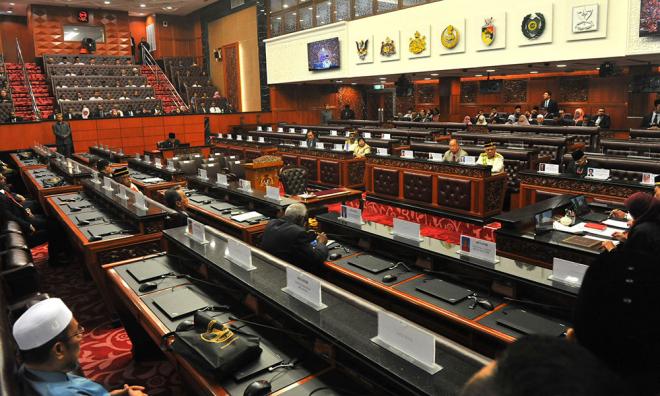
The vacancies in the Dewan Negara should be allocated to at least two senators to represent the OKU (people with disabilities) sector to better highlight issues affecting the disabled community, said the Malaysian Mental Health Association.
Its president, Dr Andrew Mohanraj told Malaysiakini today that many stakeholders have sought for two or three slots in the vacancies to be allocated to individuals representing the OKU community, with at least one to represent the mental disability segment of the community.
He noted that there is a universal trend for mainstream mental health issues to be seen as cross-cutting involving different sectors and stakeholders, hence the need for persons with mental health issues and their family members to be represented in the legislature to ensure their interests are highlighted in the Upper House.
Mohanraj said the matter is urgent as currently neither the Dewan Rakyat nor the Dewan Negara has a member who is knowledgeable or an expert on mental health and also due to the absence of an ombudsman-like body in Malaysia to safeguard the interest of persons with mental illness and their caregivers.
“The Malaysian Mental Health Association exhorts the new government to look into the request by our association and other like-minded stakeholders to consider appointing a member representing our sector to the Upper House.
“This will also send a strong signal to the outside world that Malaysia is serious in ensuring a visible representation for the sector representing persons with not only physical disability but also mental illness,” he said.
Mohanraj said this is timely in light of the ongoing movement control order (MCO) in Malaysia where mental health issues would be more pervasive not only in Malaysia but also globally in the fight against Covid-19 pandemic due to financial challenges and socio-cultural adaptation.
He noted that mental health leadership will be crucial to bring all stakeholders together for a more resilient society.
Mental Health minister
Mohanraj pointed out that Malaysia should follow the lead of a number of countries that have gone beyond token representation in the legislature and have actually scaled up leadership in mental health by creating appropriate positions in the executive as well.
He said this is in recognition of the fact that mental health issues are cross-cutting in nature and should not be seen only in the perspective of health but also its spillover into many other sectors in Malaysia such as workplace stress and loss of productivity due to depression, rising suicide cases among youths and the effect of digitalisation on mental health, among others.

He said that there is a galvanising need for the executive branch to bring together civil society and non-governmental organisations, employers, the insurance industry, and private health care providers among others to address these mental health issues.
“We are of the opinion that the new government will be sending a strong signal in the appointment of a technical resource person as 'Timbalan Menteri Kesihatan Mental dan Kesejahteraan Masyarakat' (Mental Health and People’s Welfare Deputy Minister).
“There is a precedent for this as seen globally – Scotland has a separate minister for Mental Health and so does Western Australia. There have been representations in the legislature and executive in other developed societies as well, in addition to mental health ombudsman/commissions.
“In such places, it was felt that mental health issues cannot be seen as only a part of health but unlike physical health, mental health is cross-cutting and needs to be seen beyond the ambit of health,” he said.
“Some may feel that Malaysia may not be ready for this imaginative and useful portfolio which can have far-reaching consequences. In the interim, a place in the Upper House will go a long way in assuring persons with mental disabilities and their caregivers that the leadership of the new government has the interest of the OKU mental sector at heart,” Mohanraj added.
He was responding to a Malaysiakini article on March 3 that a long list of Dewan Negara vacancies was deliberately kept open to allow the new government a free hand in choosing ministers or deputy ministers to be appointed as senators.
Speaking to Malaysiakini, a source claimed that the delays in filling the 16 Dewan Negara posts had cost Pakatan Harapan the chance to be dominant in the Senate in the event any controversial legislation needed examining.
That advantage now lies with the Perikatan Nasional government led by Prime Minister Muhyiddin Yassin, the source said.
Among these vacancies is the senatorial slot reserved for people with disabilities which fell vacant when K Bathmavathi's term expired on Oct 18 last year.
Senate appointments are for three-year terms, with a maximum of two terms.
A number of Umno-appointed senators like Khairuddin ES Abdul Samad, Megat Zulkarnain Omardin and Yahya Mat Ghani completed their second three-year term on Oct 6 last year.
The first three-year term of Umno’s Malacca appointee, Abidullah Salleh ended on Oct 26 last year, while the terms of six more Umno-aligned senators - Khairul Azwan Harun, Mustapa Kamal Mohd Yusoff, Hanafi Mamat, Rabiyah Ali, Rahemah Idris and Fahariyah Md Nordin - all expired on Dec 6 last year.
The reserved spot for the Siamese minority was occupied by Aknan Ehtook, and that too fell vacant on Dec 14 last year.
Additionally, two more spots fell vacant in 2019 due to the deaths of Indian Progressive Front president M Sambanthan on Oct 15 and MCA’s Ong Chong Swen on Nov 19. - Mkini


No comments:
Post a Comment
Note: Only a member of this blog may post a comment.